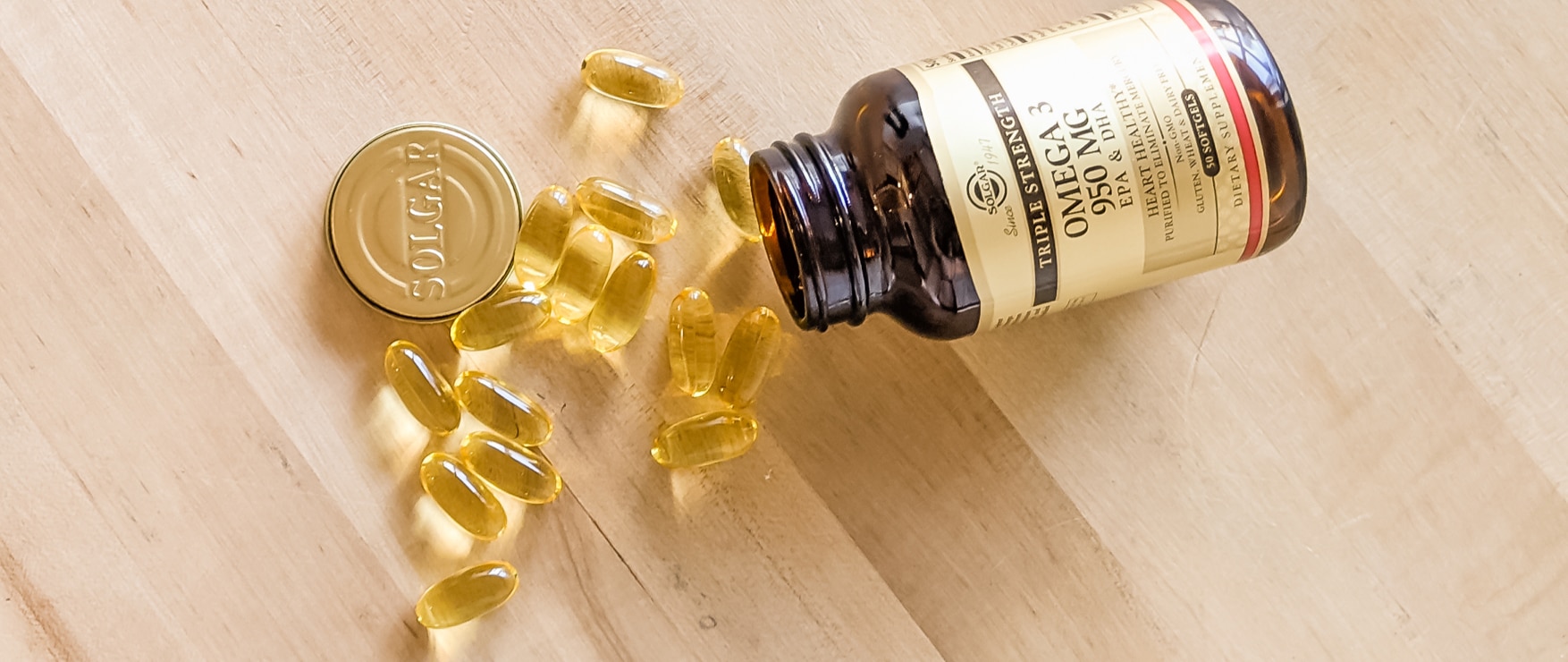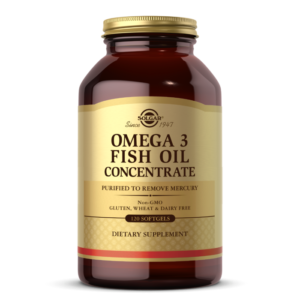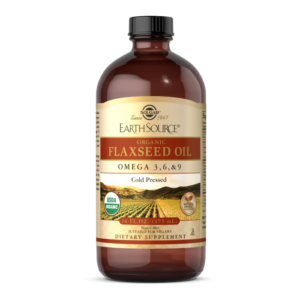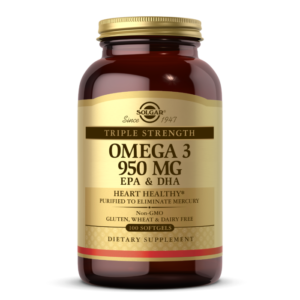Key Takeaways:
- Essential fatty acids are polyunsaturated fats that must be provided by food or supplements.
- The omega-3 fatty acids EPA and DHA are best known for their heart and cardiovascular support benefits.
Not all fats are bad fats
Let’s be real – many people hear the word “fat” and immediately assume the worst. And while the body may not need the fats found in a bag of potato chips or fast food, there are many types of fats that are involved in important functions in the body.
These are “good fats,” or essential fatty acids. Let’s take a closer look at what they are, what they do in the body, and where you can find them.
What exactly are essential fatty acids?
To understand essential fatty acids, it’s first important to understand the difference between saturated, monounsaturated, and polyunsaturated fats. Saturated fats are solid at room temperature, and are common in the American diet, found in foods such as red meat, milk, and cheese. Too many saturated fats can drive up cholesterol levels. Monounsaturated fats are liquid at room temperature and are found in olive oil, sunflower seeds, and sunflower oils. Finally, polyunsaturated fats are essential fats. They are required for normal body functions but the body cannot make them itself.
Essential fatty acids (EFAs) are polyunsaturated fatty acids that must be provided by food or supplements. There are two main types of essential polyunsaturated fats: alpha-linolenic acid (ALA), which is an omega-3 fatty acid, and linoleic acid (LA), an omega-6 fatty acid.
ALA, EPA, and DHA…what’S the difference?
You can think of the omega-3 family as a series of building blocks – each one lays the foundation for the next. Let’s take a look at the difference between ALA, EPA, and DHA.
ALA: Alpha-linolenic acid (ALA) is a type of omega-3, which can be converted to EPA and DHA in our body but the rate is fairly low. ALAis found in flax oil, pumpkin seeds, and tofu.
EPA: Eicosapentaenoic acid (EPA) is a type of long-chain omega-3, and yields health benefits more readilythan ALA. EPA offers circulatory and other heart-healthy benefits.*
DHA: Like EPA, docosahexaenoic acid (DHA) is another biologically active long-chain omega-3. The body converts DHA to signalling molecules called “eicosanoids,” which also have cardiovascular benefits.*
Why are omega-3s important?
Omega-3 fatty acids, particularly EPA and DHA, are best known for their ability to support heart and cardiovascular benefits.1
For a variety of reasons, many people do not get enough high-quality omega-3s such as EPA and DHA. Eating too many processed foods – e.g., fast foods and other convenience foods – has upset the traditional dietary balance of omega-3s and omega-6s. Some researchers estimate that low-quality omega-6s now dominate omega-3s by more than a 16-to-1 ratio in the contemporary diet.
Not to mention that trans fats, found in partially hydrogenated oils, interfere with how the body normally uses omega-3s and omega-6s by both increasing bad cholesterol and lowering good cholesterol. For metabolic reasons, omega-3s suffer the most, and ensuring you get enough daily is important.
You can help restore a more optimal balance of EFAs by regularly eating cold-water fish or taking supplements.
What foods have omega-3s?
There are many aspects to a healthy diet, and essential fatty acids are not one to overlook. Here are a few foods that are rich in omega-3 fatty acids.
Fatty fish: Fatty fish, such as salmon, trout, shellfish, and oysters, are the most well-known and popular dietary source of omega-3s. Fish oil contains two types of omega-3 fatty acids: DHA and EPA.
Walnuts: Walnuts are an excellent source of omega-3 fatty acids – just one ounce of walnuts contains 2.5 grams of ALA.2 Whether you eat them as a snack or add them as a topping on your morning yogurt, walnuts are a smart snack choice for those eating a low saturated fat and low-cholesterol diet.
Chia seeds: Chia seeds are known as nature’s superfood for a reason – they are a great source of omega-3s, 6s, and 9s, and fiber. Chia seeds also support heart health*. Mix them into a smoothie or try making your own healthy chia seed pudding to get all the heart-healthy benefits they offer.
Hemp seeds: Like chia seeds, hemp seeds are an extremely versatile and nutritious food that makes it easy to consume omega-3 fatty acids. They are also a great source of protein, zinc, and iron. Hemp seeds are a delicious addition to salads, smoothies, and homemade granola bars.
Flaxseeds: Flaxseeds are a great option for vegans, or for those who don’t like the taste of fish oil. Flaxseeds are a great source of both ALA omega-3 and omega-6 fatty acids, and play a role in providing energy for the body. Sprinkle them in a smoothie or in your oatmeal, or use them as an egg substitute in baking by mixing one tablespoon of ground flaxseed with 2 ½ tablespoons of water.
EFA Supplements
If your diet doesn’t contain enough essential fatty acids, supplements are an easy and effective solution. No matter what your omega-3 needs or your dietary restrictions are, Solgar® has an EFA supplement that fits.
Triple Strength Omega-3 950 mg Softgels: With 950 mg of omega-3 per serving, this is Solgar’s highest concentration of the natural, omega-3 polyunsaturates EPA and DHA from cold-water fish. It supports cardiovascular, joint, and skin health, so that you can feel your best.
Wild Alaskan Full Spectrum™ Omega Softgels: Wild Alaskan sockeye salmon’s natural oil is among the purest of all ocean fish and one of the richest sources of the important omega-3 fatty acids EPA and DHA. These softgels offer 100% pure, wild Alaskan salmon oil from sustainably caught sockeye salmon, as well as vitamin D3.
Omega 3-6-9 1300 mg Softgels: This formula provides a blend of three premium oils: fish, flax, and borage that contribute essential fatty acids that are necessary for health and wellbeing.
Earth Source® Organic Flaxseed Oil: This vegan-friendly formula provides one of the most concentrated plant sources of ALA omega-3s found in nature, while also supplying the omega-6 and omega-9 acids, linolenic acid, and oleic acid. The flaxseeds are pressed using a unique cold-pressing method and are processed without solvents. The oil is then filled under a nitrogen blanket to protect it from oxidation, which can reduce its benefits due to degradation.
Flaxseed Oil 1250 mg Softgels: Derived from the seeds of the flax plant, flax oil is one of the most concentrated vegetarian sources of omega-3s found in nature. These flaxseeds are cold-pressed and formulated without the use of solvents.
Omega-3 Vegetarian DHA Softgels: Vegetarian and vegan friendly, this premium-quality DHA formulation uses a trademarked algae oil which contains DHA.
GET THE LATEST UPDATES AND EXCLUSIVE DEALS WHEN YOU SIGN UP FOR OUR NEWSLETTER!
Something for everyone
Whether your diet is plant-based or otherwise, essential fatty acids are for everyone, and getting them through foods or supplements is crucial. For more information on which Solgar® supplement is right for you, send us a message. Or, for more monthly health tips, subscribe to our newsletter.
*These statements have not been evaluated by the Food and Drug Administration. These products are not intended to diagnose, treat, cure, or prevent any disease.
The information provided on this site is intended for your general knowledge only and is not a substitute for professional medical advice or treatment for specific medical conditions. Always seek the advice of your physician or another qualified healthcare provider with any questions you may have regarding a medical condition. The information on this website is not intended to diagnose, treat, cure, or prevent any disease. Never disregard medical advice or delay in seeking it because of something you have read on the Solgar® site.





